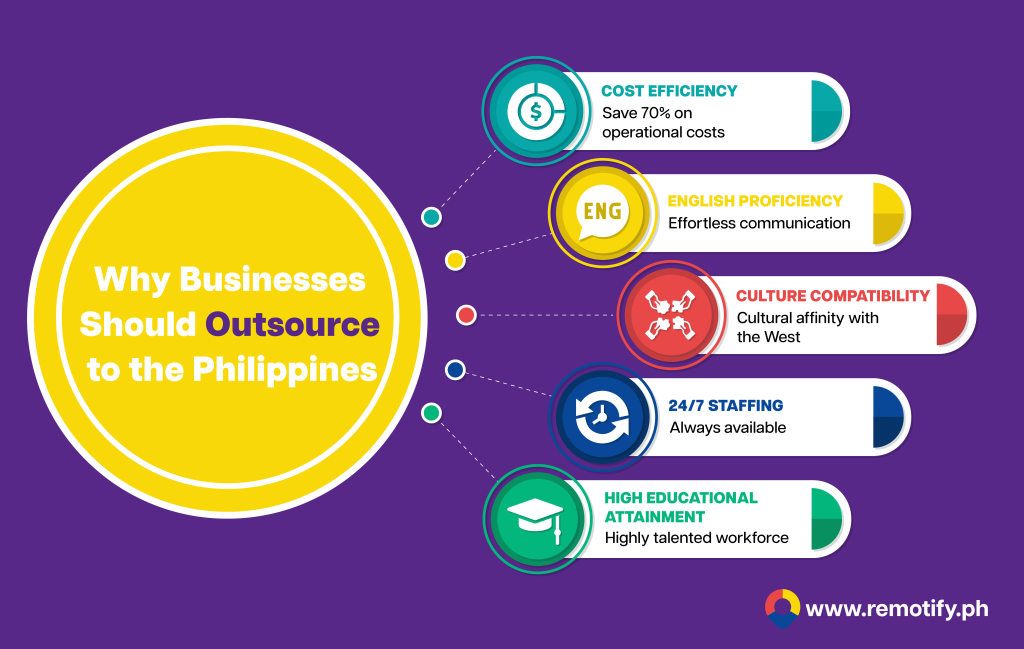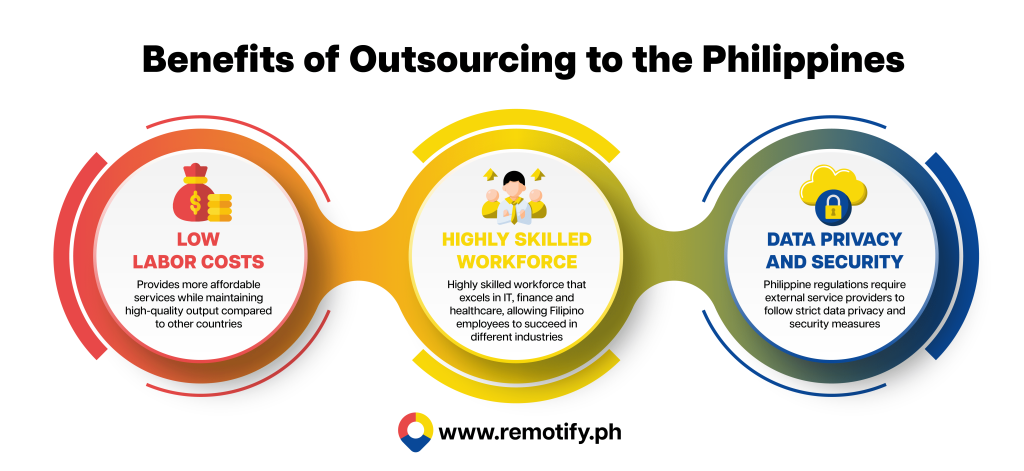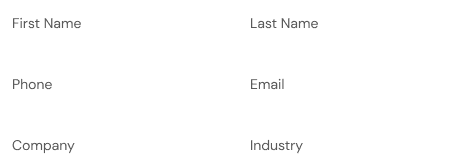
The Rise of Outsourcing in the Philippines
The Philippines holds approximately 10% to 15% of the global BPO market, positioning it as a key international player in the outsourcing industry.
The local BPO industry contributes $32.5 billion annually to the economy, which makes outsourcing a great source of opportunity and revenue for the country.
Despite challenges in the global market, the Philippine outsourcing industry’s revenues continued to climb even during the pandemic. By 2022, the outsourcing industry reached over 1.4 million employees, surpassing its original target.
The Philippines is considered one of the top outsourcing destinations in the world — and there are several reasons why this is the case.
Why Businesses Should Outsource to the Philippines

Cost efficiency
You can save 70% of operational costs by outsourcing in the Philippines because of the low living costs, allowing you to allocate resources to other high-priority areas.
English proficiency
Filipinos have a high English proficiency at a young age as this is the medium of instruction in schools. This ensures Filipino employees can easily understand and communicate with English-speaking international employers.
Culture compatibility
The Philippines has a long history of being occupied by countries such as Spain and the United States. This gives the Philippines a strong cultural affinity with Western countries, which makes it easy for Filipinos to adapt to an international work environment.
24/7 staffing
The Philippine outsourcing ecosystem is very mature and is built for the global employment market. Highly westernised with a 24/7 culture in the metros, the workforce can provide business solutions anytime and anywhere, regardless of the time difference. This benefits businesses with customer service and online sales, which require 24/7 availability.
High educational attainment
The Philippines produces 700,000 university graduates per yet, creating a highly skilled and talented workforce that can compete in the global employment market and provide businesses with high-performing employees.
Benefits of Outsourcing to the Philippines

By outsourcing to the Philippines, you can experience the following benefits for your business:
Low labour costs
The Philippines provides more affordable services while maintaining high-quality output compared to other countries. For example, China may offer lower labour costs than the Philippines, but may not be as English-proficient and culturally compatible as Filipino workers.
Highly skilled workforce
The Philippines has a highly skilled workforce that excels in IT, finance and healthcare, allowing Filipino employees to succeed in different industries. You can be confident that your outsourced staff from the Philippines will demonstrate proficiency and competence in their respective fields.
Data privacy and security
Sensitive data and confidential business information are often shared with third-party service providers when outsourcing work, which is why it’s important for you to consider data privacy and security when choosing an outsourcing provider.
Philippine regulations require external service providers to follow strict data privacy and security measures. You can trust your external service providers in the Philippines to implement measures to adequately protect sensitive data.
Popular Outsourcing Services in the Philippines
There are three common types of outsourcing services in the Philippines you can choose from.
Professional Employer Organisation
While a Professional Employer Organisation (PEO) acts as a company’s outsourced HR partner, it is not the employer of the organisation’s workforce. PEOs serve as co-employer for businesses and work well for small enterprises with full-time employees. This requires you to have an entity in the country you are employing your team in.
Employer of Record
Unlike a PEO, an Employer of Record (EOR) takes on all employer-related responsibilities for small to large businesses. An Employer of Record can quickly hire top talent for your business without requiring you to set up a local entity while ensuring you remain compliant and reduce costs in the long run.
Fully managed services
This is also known as the traditional business process outsourcing model (BPO), which is best for business owners that have a hands-off approach, as the BPO will handle on-ground and on-site operations for outsourced employees. This also means you will not have control over the hiring process for your team or their wages. The traditional BPO pricing structures are typically bundled and offer no transparency as to how much of the fee goes to your team.
Companies that Outsource to the Philippines
Outsourcing to the Philippines has contributed to the success of numerous companies, some of the most popular ones being:
According to Bloomberg, Google has more outsourced workers than direct employees, and many of their contract workers are from the Philippines.
Outsourcing in the Philippines enables Google Inc. to fill in support roles and specialised positions at affordable labour costs while maintaining quality output from top talent.
American Express
A well-known credit card company in the Philippines, American Express works alongside BPO companies in the Philippines to offload non-core tasks to external providers. This allows the business to focus on key business areas while its back-office solutions are handled by outsourced employees.
Wells Fargo
Another well-known multinational company that works with outsourced teams is Wells Fargo, which has a wide pool of dedicated remote professionals across Asia. Some of the tasks that Wells Fargo outsources in the Philippines include fraud management, financial accounting, payroll and customer support.
Choosing the Right Outsourcing Partner in the Philippines
Before you decide to choose an outsourcing provider in the Philippines, you must consider the following factors first.
The political and economic landscape in the Philippines
As a business, you need to consider a location’s political, social and economic health to develop a solid outsourcing strategy. Philippine regulations and governing bodies are supportive of the outsourcing industry because of its significant contribution to the national economy, resulting in little to no risks when outsourcing in the country.
Company values and goals
You need to review a potential provider’s company values and goals, ensuring that their principles align with yours.
Company reputation
Check a potential service provider’s track record and reputation to ensure that you are partnering with a credible company.
Expertise and services
Identify the type of outsourcing services your business needs and make sure to assess whether a potential provider has a specialisation in different fields (e.g. IT, finance, customer service).
Budget adherence
Canvass the fees for the options you’re considering and calculate which providers can reduce costs for your business and which are more expensive in the long run.
How Remotify Helps Businesses
Remotify is one of the leading Employer of Record service providers in the Philippines. It is committed to being a good business for all — from its clients to its remote employees.
Businesses can expect the following benefits from partnering with Remotify:
- Lower costs to employ top talents
- Eliminate office rental costs
- Efficient payroll processes
- Ensure compliance with labour standards
- Secure your team's local benefits
- No separate local business entity required
- Manage your team directly and keep control of your business processes
- Keep your team engagement high
- Prevent the loss of great talents
Case Study: National Corporate Housing Expands Operations with the Help of Remotify
National Corporate Housing offers temporary, furnished corporate housing around the world and is headquartered in the United States. As its Employer of Record, Remotify provides HR support to National Corporate Housing, ensuring that the company maximises its talent.
“Remotify’s in-region service and elevated customer experience, combined with their understanding of our business and organisational needs, really set them apart from other potential HR suppliers.” — Tom Meertens, COO of National Corporate Housing
Frequently Asked Questions
1. Why do foreign companies want to outsource in the Philippines?
The Philippines is considered one of the top outsourcing destinations for many reasons. Foreign companies that partner with a top outsourcing provider in the Philippines can expect the following:
- Cost efficiency
- English proficiency
- Culture compatibility
- 24/7 staffing
- Flexible workforce
2. Why outsourcing to the Philippines is better than any other country in Asia?
The combination of qualities that the Philippine workforce possess enable the country’s outsourcing services to compete globally.
For example, India may have a larger pool of IT professionals, but the Philippines has an advantage in terms of English proficiency and cultural similarity to Western countries. Vietnam may offer lower labour costs, but it may not have the same level of expertise as the Philippines in certain industries, such as call centre services and accounting and data entry services.
3. How much does IT cost to outsource to the Philippines?
While there are many variables that you need to consider (such as the services you need and the duration of the project), IT outsourcing services in the Philippines can range from US$80 - US$150 per user every month.
4. What business processes are usually outsourced in the Philippines?
The three most common business processes outsourced in the Philippines are:
- Call centre services
- Accounting services
- Data entry services
5. What is the average cost of outsourcing to the Philippines?
In the Philippines, outsourcing companies typically calculate fees based on workforce costs, service fees and government-mandated employee benefits. Outsourcing rates may vary depending on the company you partner with, but the average cost is approximately US$285,000, including the contract bid price and contract administration fee.
Jump straight to a key chapter
Spending Too
Much Time
Onboarding?
your remote hiring in the
Philippines, excellently.
Say Goodbye to High Costs!
Request Your Free Consultation Today andSave a Massive 70% on Your Workforce!

Ready to thrive in a remote-first work environment?


